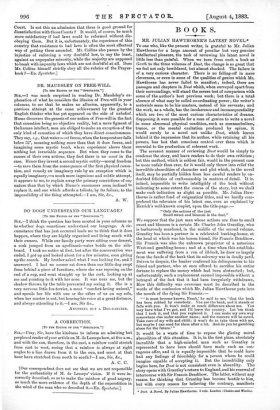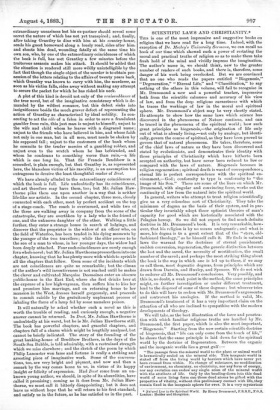BOOKS.
MR. JULIAN HAWTHORNE'S LATEST NOVEL.* To one who, like the present writer, is grateful to Mr. Julian Hawthorne for a large amount of peculiar but very genuine intellectual pleasure, the task of reviewing his latest novel 'is little less than painful. Wben we turn from such a book as • Garth to the three volumes of Dust, the change is so great that we feel not only bewildered, but almost shocked. The failure is of a very curious character. There is no falling-off in mere cleverness, or even in some of the qualities of genius which Mr. Hawthorne has never failed to manifest; indeed, there are passages and chapters in Dust which, when surveyed apart from their surroundings, will stand the severe teat of comparison with some of the author's best previous work; but there is a total absence of what may be called co-ordinating power; the writer's materials seem to be his masters, instead of his servants; and the work, as a whole, has the incoherence and inconsequentiality which are two of the most curious characteristics of dreams. Supposing it were possible for a man of genius to write a novel in some abnormal physical condition, such as somnambulism,. trance, or the mental exaltation produced by opium, it would surely be a novel not unlike Dust, which leaves behind it the impression that its author, while retaining all his powers, has lost that conscious control over them which is essential to the production of coherent work.
The severest manner of reviewing Dust would be simply to- condense the story, and leave readers to do their own criticism;, but this method, which is seldom fair, would in the present case be more unfair than ever, for it would only throw into relief the incredible absurdities of character and plot which, in the novel itself, may be partially hidden from less careful readers by un- doubted felicities of craftsmanship in matters of detail. It is, indeed, impossible to write intelligibly of the book without indicating to some extent the course of the story, but we shall make such indication as slight as possible. Mr. Julian Haw- thorne is rather fond of enigmatical titles, and we hardly com- prehend the relevance of his latest one, even as explained by Herrick's well-known couplet, upon the title-page :— " Only the actions of the just
Smell sweet and blossom in the dust."
We suppose that the just man whose actions are thus to smell sweet and blossom is a certain Mr. Charles John Grantley, who is barbarously murdered, in the middle of the second volume.- Grantley has been a partner in a celebrated banking-house, at
the head of which was his bosom friend, Sir Francis Bendibow. Sir Francis was also the unknown proprietor of a, notorious
West-end gambling-house ; and at a time when this establish- ment was suffering from a run of ill-luck, he drew so largely- from the funds of the bank that its solvency was in deadly peril.. Driven to despair, the banker confessed his delinquencies to his friend and partner, who at once offered to sacrifice his entire fortune to replace the money which had been abstracted ; but,. unfortunately, such a replacement seemed impossible without a betrayal of the fact that it had been irregularly withdrawn. How this difficulty was overcome must be described in the words of the confession which Mr. Julian Hawthorne puts into the mouth of the dying Sir Francis:-
"' It must become known, Frank,' be said to me, that the bank has been robbed by somebody. You are the bank, and it stands or falls with you. It won't make so much difference about me. Yoa may have what I've. got, and ru leave the country. Let 'em think that I took it, and that you replaced it. I can make my own way somewhere else under another name ; and the concern will be saved. Take care of my wife and child; it won't do to take them with me, but maybe I can send for them after a bit. And do you let gambling alone for the future.' " It would be a waste of time to expose the glaring moral absurdities of this situation. It is, in the first place, absolutely incredible that a high-minded man such as Grantley is represented to have been should have made such an out- rageous offer, and it is equally impossible that he could have had any feelings of friendship for a person whom he could imagine capable of accepting it. But the incredibility only begins here, for Dust is not consistent even in absurdity. The story opens with Grantley's return to England, and his renewal of intercourse with Sir Francis Bendibow. The latter, without any reason for thinking that Grantley has become hostile to him, but with every reason for believing the contrary, manifests
• Bust. A Hoed. By Julian Hawthorne. 3 vole. London Ghetto and Winans.
extraordinary uneasiness lest his ex-partner should reveal some- secret the nature of which has not yet transpired ; and, finally, after taking Grantley to dine with him at his country-house, sends his guest homeward along a lonely road, rides after him, and shoots him dead, wounding fatally at the same time his own son, who, by one of the extraordinary coincidences of which the book is full, has met Grantley a few minutes before the traitorous assassin makes his attack. It should beadded that the situation is rendered still more wildly unintelligible by the fact that though the single object of the murder is to obtain pos- session of the letters relating to the affairs of twenty years back, which Grantley was known to carry with him, the murderer, as soon as his victim falls, rides away without making any attempt to secure the packet for which he has risked his neck.
A plot of this kind is devoid not only of the vraisentblance of the true novel, but of the imaginative consistency which is de- manded by the wildest romance, but this defect sinks into insignificance beside the much graver defect of representing the action of Grantley as characterised by ideal nobility. In con- senting to act the role of a felon in order to save a fraudulent gambler from ruin, this just man is unjust to himself; unjust to the wife and child whom be leaves with a disgraced name; unjust to the friends who have believed in him, and whose faith not only in one man, but in all men, must needs be shaken by his supposed fall ; unjust to the customers of the bank whom he commits to the tender mercies of a gambling robber, and unjust even to the wretch whom he has befriended, and whom he condemns to something worse than ruin,—a life which is one long lie. That Sir Francis Bendibow is a scoundrel, is plain enough, but that Grantley is, as represented here, the blameless victim of his rascality, is an assumption too outrageous to deceive the least thoughtful reader of .Dust.
We have already alluded to the extraordinary coincidences of which the book is full. Life undoubtedly has its coincidences, and art therefore may have them, too ; but Mr. Julian Haw- thorne piles them one upon another in a way that is neither life-like nor artistic. In the second chapter, three men, closely connected with each other, meet by perfect accident on the top of a stage-coach. The coach is overturned, and while two of the three are walking away in company from the scene of the catastrophe, they are overtaken by a lady who is the friend of one, and the unknown daughter of the other. Walking a little further, they enter a strange house in search of lodgings, and discover that the proprietor is the widow of an officer who, on the field of Waterloo, has been tended in his dying moments by the younger of the two travellers; while the elder proves to be the son of a man to whom, in her younger days, the widow had been deeply attached. Four such coincidences are surely enough for a whole novel; but Mr. Julian Hawthorne presses them into one chapter, knowing that he has plenty more with which to sprinkle all the chapters that follow. Even some of the incidents which are not coincidences are quite as remarkable; but the climax of the author's wild inventiveness is not reached until he makes the clever and cultivated Marquise Desmoines enter an obscure public-house in the East End, where she first drinks beer at the expense of a low highwayman, then suffers him to kiss her and promises him marriage, and on returning home to her mansion in the West, dresses herself gorgeously, and proceeds to commit suicide by the gratuitously unpleasant process of inhaling the flame of a lamp fed by some nameless poison.
It will naturally be asked whether such a novel as this is worth the trouble of reading, and curiously enough, a negative answer cannot be returned. In Dust, Mr. Julian Hawthorne is undoubtedly at his worst, but he is Mr. Julian Hawthorne still. The book has powerful chapters, and graceful chapters, and chapters full of a charm which might be lengthily analysed, but cannot be briefly indicated. The story of the founding of the great banking-house of Bendibow Brothers, in the days of the South-Sea Bubble, is told admirably, with a restrained strength which we miss elsewhere ; and the sketch of the poem by which Philip Lancaster won fame and fortune is really a striking and arresting piece of imaginative work. Some of the conversa- tions, too, are very bright and piquant, and now and then a remark by the way comes home to us, in virtue of its happy insight or felicity of expression. Had Dust come from an un known young author, we should, in spite of its absurdities, have called it promising ; coming as it does from Mr. Julian Haw- thorne, we must call it bitterly disappointing; but it does not leave us without hope that he will return to his first standard, and satisfy us in the future, as he has satisfied us in the past.



































 Previous page
Previous page